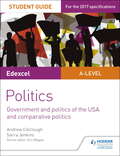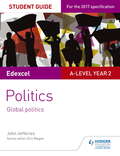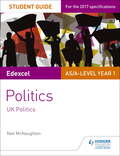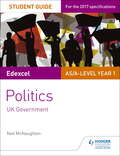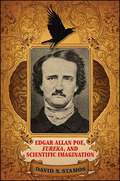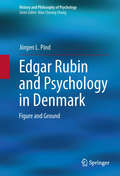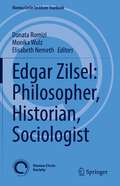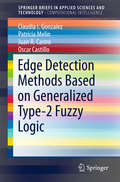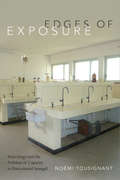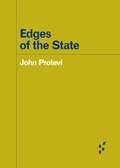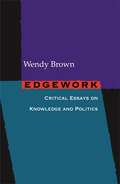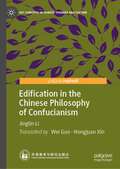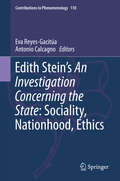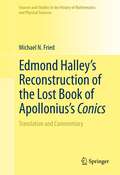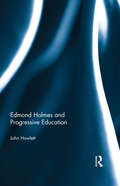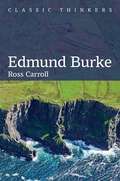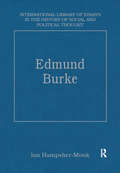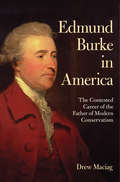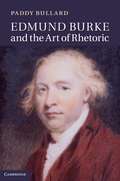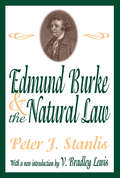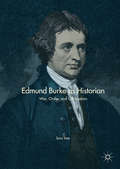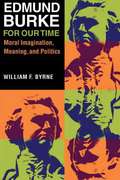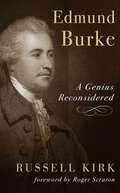- Table View
- List View
Edexcel A-level Politics Student Guide 4: Government and Politics of the USA
by Andrew Colclough Sarra JenkinsExam board: EdexcelLevel: A-levelSubject: PoliticsFirst teaching: September 2017First exams: Summer 2018 (AS) Summer 2019 (A-Level)Written by experienced teachers Andrew Colclough and Sarra Jenkins this Student Guide for Politics:-Identifies the key content you need to know with a concise summary of topics examined in the A-level specifications-Enables you to measure your understanding with exam tips and knowledge check questions, with answers at the end of the guide-Helps you to improve your exam technique with sample answers to exam-style questions-Develops your independent learning skills with content you can use for further study and research
Edexcel A-level Politics Student Guide 5: Global Politics
by John JefferiesWritten by experienced teacher John Jefferies this Student Guide for Politics:-Identifies the key content you need to know with a concise summary of topics examined in the A-level specifications-Enables you to measure your understanding with exam tips and knowledge check questions, with answers at the end of the guide-Helps you to improve your exam technique with sample answers to exam-style questions-Develops your independent learning skills with content you can use for further study and research
Edexcel AS/A-level Politics Student Guide 1: UK Politics
by Neil McNaughtonExam Board: EdexcelLevel: AS/A-levelSubject: PoliticsFirst Teaching: September 2017First Exam: June 2018Reinforce your understanding throughout the course. Clear topic summaries with sample questions and answers will help you improve your exam technique to achieve higher grades.Written by experienced author Neil McNaughton this Student Guide for Politics:-Identifies the key content you need to know with a concise summary of topics examined in the AS/A-level specifications-Enables you to measure your understanding with exam tips and knowledge check questions, with answers at the end of the guide-Helps you to improve your exam technique with sample answers to exam-style questions-Develops your independent learning skills with content you can use for further study and research
Edexcel AS/A-level Politics Student Guide 1: UK Politics
by Neil McNaughtonExam Board: EdexcelLevel: AS/A-levelSubject: PoliticsFirst Teaching: September 2017First Exam: June 2018Reinforce your understanding throughout the course. Clear topic summaries with sample questions and answers will help you improve your exam technique to achieve higher grades.Written by experienced author Neil McNaughton this Student Guide for Politics:-Identifies the key content you need to know with a concise summary of topics examined in the AS/A-level specifications-Enables you to measure your understanding with exam tips and knowledge check questions, with answers at the end of the guide-Helps you to improve your exam technique with sample answers to exam-style questions-Develops your independent learning skills with content you can use for further study and research
Edexcel AS/A-level Politics Student Guide 2: UK Government
by Neil McNaughtonWritten by experienced author Neil McNaughton this Student Guide for Politics:-Identifies the key content you need to know with a concise summary of topics examined in the AS/A-level specifications-Enables you to measure your understanding with exam tips and knowledge check questions, with answers at the end of the guide-Helps you to improve your exam technique with sample answers to exam-style questions-Develops your independent learning skills with content you can use for further study and research
Edgar Allan Poe, Eureka, and Scientific Imagination
by David N. StamosSilver Winner, 2017 Foreword INDIES Book of the Year Awards in the Philosophy categoryIn 1848, almost a year and a half before Edgar Allan Poe died at the age of forty, his book Eureka was published. In it, he weaved together his scientific speculations about the universe with his own literary theory, theology, and philosophy of science. Although Poe himself considered it to be his magnum opus, Eureka has mostly been overlooked or underappreciated, sometimes even to the point of being thought an elaborate hoax. Remarkably, however, in Eureka Poe anticipated at least nine major theories and developments in twentieth-century science, including the Big Bang theory, multiverse theory, and the solution to Olbers' paradox. In this book—the first devoted specifically to Poe's science side—David N. Stamos, a philosopher of science, combines scientific background with analysis of Poe's life and work to highlight the creative and scientific achievements of this text. He examines Poe's literary theory, theology, and intellectual development, and then compares Poe's understanding of science with that of scientists and philosophers from his own time to the present. Next, Stamos pieces together and clarifies Poe's theory of scientific imagination, which he then attempts to update and defend by providing numerous case studies of eureka moments in modern science and by seeking insights from comparative biography and psychology, cognitive science, neuroscience, and evolution.
Edgar Rubin and Psychology in Denmark: Figure and Ground
by Jörgen L. PindEdgar Rubin was one of the outstanding pioneers of perceptual psychology in the early twentieth century. His approach involved a turning away from an earlier elementaristic psychology towards an approach based on "perceptual wholes." Rubin's approach is closely linked to the Gestalt revolution in perceptual psychology and was eagerly embraced by the Gestaltists. This has often led to Rubin being classified as a Gestalt psychologist. This misrepresents his position as is shown in the book. Rubin's aim was to develop a descriptive psychology -- or aspective psychology to use his terminology -- which would do full justice to the complex nature of psychological phenomena. Thus he rejected attempts by the Gestalt psychologists to explain diverse phenomena within a single overarching framework. While Rubin is internationally often misclassified as a Gestalt psychologist, in Denmark he is often hailed as a pioneer of a specific Danish "school of phenomenology." This also misrepresents Rubin's approach who was highly critical of psychological "schools." His criticisms of the overambitious theoretical aspirations of Gestalt psychology, his negative attitude towards school formation in psychology were both highly prescient. What remains today of Gestalt psychology is primarily its descriptive parts; the idea of schools of psychology, so common in early twentieth century psychology is now seen as a totally outmoded viewpoint. There is an interesting moral in this story for the history and status of psychology; to wit, that Rubin's emphasis on the correct description of psychological phenomena shows what is likely to live on as classic contributions to psychology. This certainly holds for his own work on figure and ground which, after almost a century, is still universally known and admired by psychologists. He was indeed a consummate psychological observer. The book argues for the importance of description in psychology.
Edgar Zilsel: Philosopher, Historian, Sociologist (Vienna Circle Institute Yearbook #27)
by Elisabeth Nemeth Donata Romizi Monika WulzThis book provides a new all-round perspective on the life and work of Edgar Zilsel (1891-1944) as a philosopher, historian, and sociologist. He was close to the Vienna Circle and has been hitherto almost exclusively referred to in terms of the so-called “Zilsel thesis” on the origins of modern science. Much beyond this “thesis”, Zilsel’s brilliant work provides original insights on a broad number of topics, ranging from the philosophy of probability and statistics to the concept of “genius”, from the issues of scientific laws and theories to the sociological background of science and philosophy, and to the political analysis of the problems of his time. Praised by Herbert Feigl as an “outstanding brilliant mind”, Zilsel, being as a Social-Democrat of Jewish origins, mostly led a life of hardship marked by emigration and coming to a sudden and tragic end by suicide in 1944. The impossibility of an academic career has hindered the reception of Zilsel’s scientific work for a long time. This volume is a contribution to its late reception, providing new insights especially into his work during his years in Vienna; moreover, it shows the heuristic value of Zilsel’s ideas for future scholarly research – in philosophy, history, and sociology.
Edge Detection Methods Based on Generalized Type-2 Fuzzy Logic
by Oscar Castillo Patricia Melin Juan R. Castro Claudia I. GonzalezIn this book four new methods are proposed. In the first method the generalized type-2 fuzzy logic is combined with the morphological gra-dient technique. The second method combines the general type-2 fuzzy systems (GT2 FSs) and the Sobel operator; in the third approach the me-thodology based on Sobel operator and GT2 FSs is improved to be applied on color images. In the fourth approach, we proposed a novel edge detec-tion method where, a digital image is converted a generalized type-2 fuzzy image. In this book it is also included a comparative study of type-1, inter-val type-2 and generalized type-2 fuzzy systems as tools to enhance edge detection in digital images when used in conjunction with the morphologi-cal gradient and the Sobel operator. The proposed generalized type-2 fuzzy edge detection methods were tested with benchmark images and synthetic images, in a grayscale and color format. Another contribution in this book is that the generalized type-2 fuzzy edge detector method is applied in the preprocessing phase of a face rec-ognition system; where the recognition system is based on a monolithic neural network. The aim of this part of the book is to show the advantage of using a generalized type-2 fuzzy edge detector in pattern recognition applications. The main goal of using generalized type-2 fuzzy logic in edge detec-tion applications is to provide them with the ability to handle uncertainty in processing real world images; otherwise, to demonstrate that a GT2 FS has a better performance than the edge detection methods based on type-1 and type-2 fuzzy logic systems.
Edges of Exposure: Toxicology and the Problem of Capacity in Postcolonial Senegal (Experimental Futures)
by Noémi TousignantIn the industrialized nations of the global North, well-funded agencies like the CDC attend to citizens' health, monitoring and treating for toxic poisons like lead. How do the under-resourced nations of the global South meet such challenges? <P><P> In Edges of Exposure, Noémi Tousignant traces the work of toxicologists in Senegal as they have sought to warn of and remediate the presence of heavy metals and other poisons in their communities. Situating recent toxic scandals within histories of science and regulation in postcolonial Africa, Tousignant shows how decolonization and structural adjustment have impacted toxicity and toxicology research. <P>Ultimately, as Tousignant reveals, scientists' capacity to conduct research—as determined by material working conditions, levels of public investment, and their creative but not always successful efforts to make visible the harm of toxic poisons—affects their ability to keep equipment, labs, projects, and careers going.
Edges of the State (Forerunners: Ideas First)
by John ProteviUsing philosophical and scientific work to engage the perennial question of human nature This book takes a look at the formation, and edges, of states: their breakdowns and attempts to repair them, and their encounters with non-state peoples. It draws upon anthropology, political philosophy, neuroscience, evolutionary biology, child developmental psychology, and other fields to look at states as projects of constructing &“bodies politic,&” where the civic and the somatic intersect. John Protevi asserts that humans are predisposed to &“prosociality,&” or being emotionally invested in social partners and patterns. With readings from Jean-Jacques Rousseau and James C. Scott; a critique of the assumption of widespread pre-state warfare as a selection pressure for the evolution of human prosociality and altruism; and an examination of the different &“economies of violence&” of state and non-state societies, Edges of the State sketches a notion of prosocial human nature and its attendant normative maxims. Forerunners: Ideas First Short books of thought-in-process scholarship, where intense analysis, questioning, and speculation take the lead
Edgework: Critical Essays on Knowledge and Politics
by Wendy BrownEdgework brings together seven of Wendy Brown's most provocative recent essays in political and cultural theory. They range from explorations of politics post-9/11 to critical reflections on the academic norms governing feminist studies and political theory. Edgework is also concerned with the intellectual and political value of critique itself. It renders contemporary the ancient jurisprudential meaning of critique as krisis, in which a tear in the fabric of justice becomes the occasion of a public sifting or thoughtfulness, the development of criteria for judgment, and the inauguration of political renewal or restoration. Each essay probes a contemporary problem--the charge of being unpatriotic for dissenting from U.S. foreign policy, the erosion of liberal democracy by neoliberal political rationality, feminism's loss of a revolutionary horizon--and seeks to grasp the intellectual impasse the problem signals as well as the political incitement it may harbor.
Edification in the Chinese Philosophy of Confucianism (Key Concepts in Chinese Thought and Culture)
by Jinglin LiThis pivot focuses on “the concept of edification” in a bid to systematically expound its connotative structure and logical evolution. It is divided into ten chapters, embracing various issues, such as human nature as the foundation of edification, the development of edification and cultivation, the evolution of edification and the resultant life based on ritual and music, the political orientation and ultimate care of edification, and the nurturing of social edification, in an effort to offer a panoramic view of the intellectual features of Confucianism, and consequently a profound reflection on the cultural consciousness of contemporary China. The book is expected to satisfy the needs for a better understanding of edification as a Confucian concept, and the conceptual features of Chinese philosophy, or rather, Confucianism.
Edith Stein’s An Investigation Concerning the State: Sociality, Nationhood, Ethics (Contributions to Phenomenology #110)
by Antonio Calcagno Eva Reyes-GacitúaThis book explores Edith Stein's phenomenology of the state. It features chapters on the application of Stein’s political philosophy to real issues and questions affecting nations today. The contributors also situate Stein’s political theory within her larger philosophical corpus. The collection examines An Investigation Concerning the State from various angles. Scholars first consider some of the direct claims Stein makes about social and political ontology. They mine her work for its implications for and applications to contemporary debates. Then, the contributors position her work in relation to other figures in phenomenology, including Edmund Husserl and Max Scheler. Finally, Stein’s views are brought to bear on other disciplines, including feminism, theology, and literature. The contributors also use her theory of the state to address various contemporary issues, including bioethics and rights, globalization, as well as social and political inequality. The view of the state that emerges has implications for how we do politics and make ethical decisions. Moreover, Stein's work has an impact on our views of sociality (as opposed to the sociality of contractarian views of the state), pedagogy, women, theories of justice and law, as well as social psychology and religion. This volume helps readers better understand this vital voice in political philosophy and appeals to students, professors, and researchers working in the field.
Edmond Halley’s Reconstruction of the Lost Book of Apollonius’s Conics
by Michael N. FriedApollonius's Conics was one of the greatest works of advanced mathematics in antiquity. The work comprised eight books, of which four have come down to us in their original Greek and three in Arabic. By the time the Arabic translations were produced, the eighth book had already been lost. In 1710, Edmond Halley, then Savilian Professor of Geometry at Oxford, produced an edition of the Greek text of the Conics of Books I-IV, a translation into Latin from the Arabic versions of Books V-VII, and a reconstruction of Book VIII. The present work provides the first complete English translation of Halley's reconstruction of Book VIII with supplementary notes on the text. It also contains 1) an introduction discussing aspects of Apollonius's Conics 2) an investigation of Edmond Halley's understanding of the nature of his venture into ancient mathematics, and 3) an appendices giving a brief account of Apollonius's approach to conic sections and his mathematical techniques. This book will be of interest to students and researchers interested in the history of ancient Greek mathematics and mathematics in the early modern period.
Edmond Holmes and Progressive Education
by John HowlettAlthough considered a figure of great importance and influence by his contemporaries, Edmond Holmes has been consigned to relative obscurity in the progressive educational tradition. This book reinstates Holmes as a key figure in the history of progressive education, both as a school inspector and educational thinker, who was instrumental in forming a set of ideas and principles which continue to resonate in education today. Combining biographical detail and key critical analysis, Edmond Holmes and Progressive Education brings together the key ideas and aspects of Holmes’ life and establishes his writings as amongst the most insightful ever produced by an educationalist. Throughout his inspectorial career, Holmes scorned mechanical obedience in the classroom and was appalled by the inability of teachers to allow pupils to express themselves freely and imaginatively. His seminal publications positioned him at the vanguard of educational reforms. His work, however, was not exclusively educational, and throughout his life Holmes published on religion, philosophy, poetry and literature, subsuming his educational viewpoint into a much wider ‘philosophy of life’. His spiritual leanings and call for an improved education system, which would draw out the potential for development from within the child, inspired successive generations of progressive educators. In studying Edmond Holmes in detail, this book makes an important contribution to current debates surrounding creativity and the curriculum, in particular, the need for alternative educational voices within the state system of regulation. This book will be key reading for postgraduate students and researchers who are interested in progressive education, the history of education and educational policy and politics.
Edmond Holmes and Progressive Education
by John HowlettAlthough considered a figure of great importance and influence by his contemporaries, Edmond Holmes has been consigned to relative obscurity in the progressive educational tradition. This book reinstates Holmes as a key figure in the history of progressive education, both as a school inspector and educational thinker, who was instrumental in forming a set of ideas and principles which continue to resonate in education today. Combining biographical detail and key critical analysis, Edmond Holmes and Progressive Education brings together the key ideas and aspects of Holmes’ life and establishes his writings as amongst the most insightful ever produced by an educationalist.Throughout his inspectorial career, Holmes scorned mechanical obedience in the classroom and was appalled by the inability of teachers to allow pupils to express themselves freely and imaginatively. His seminal publications positioned him at the vanguard of educational reforms. His work, however, was not exclusively educational, and throughout his life Holmes published on religion, philosophy, poetry and literature, subsuming his educational viewpoint into a much wider ‘philosophy of life’. His spiritual leanings and call for an improved education system, which would draw out the potential for development from within the child, inspired successive generations of progressive educators.In studying Edmond Holmes in detail, this book makes an important contribution to current debates surrounding creativity and the curriculum, in particular, the need for alternative educational voices within the state system of regulation. This book will be key reading for postgraduate students and researchers who are interested in progressive education, the history of education and educational policy and politics.
Edmund Burke (Classic Thinkers)
by Ross CarrollFew thinkers have provoked such violently opposing reactions as Edmund Burke. A giant of eighteenth-century political and intellectual life, Burke has been praised as a prophet who spied the terror latent in revolutionary or democratic ideologies, and condemned as defender of social hierarchy and outmoded political institutions. Ross Carroll tempers these judgments by situating Burke’s arguments in relation to the political controversies of his day. Burke’s writings must be understood as rhetorically brilliant exercises in political persuasion aimed less at defending abstract truths than at warning his contemporaries about the corrosive forces – ideological, social, and political – that threatened their society. Drawing on Burke’s enormous corpus, Carroll presents a nuanced portrait of Burke as, above all, a diagnostician of political misrule, whether domestic, foreign, or imperial. Burke’s lasting value, Carroll argues, derives less from the content of his specific positions than from the difficult questions he forces us to ask of ourselves. This engaging and illuminating account of Burke’s work is a vital reference for students and scholars of history, philosophy, and political thought.
Edmund Burke (International Library of Essays in the History of Social and Political Thought)
by Iain Hampsher-MonkEdmund Burke’s iconic stance against the French Revolution and its supposed Enlightenment inspiration, has ensured his central role in debates about the nature of modernity and freedom. It has now been rendered even more complex by post-modern radicalism’s repudiation of the Enlightenment as repressive and its reason as illusionary. Not only did Burke’s own work cover a huge range - from aesthetics through history to constitutional politics and political theory - it has generated an enormous literature drawing on many disciplines, as well as continuing to be recruited in a range of contemporary polemics. In Edmund Burke, Iain Hampsher Monk presents a representative selection of articles and essays from the last 50 years of this scholarship. His introduction provides a brief biography and seeks to guide the reader through the chosen pieces as well as indicating its relationship to other and more substantial studies that form the critical heritage of this major figure.
Edmund Burke In America
by Drew MaciagThe statesman and political philosopher Edmund Burke (1729-1797) is a touchstone for modern conservatism in the United States, and his name and his writings have been invoked by figures ranging from the arch Federalist George Cabot to the twentieth-century political philosopher Leo Strauss. But Burke's legacy has neither been consistently associated with conservative thought nor has the richness and subtlety of his political vision been fully appreciated by either his American admirers or detractors. In Edmund Burke in America, Drew Maciag traces Burke's reception and reputation in the United States, from the contest of ideas between Burke and Thomas Paine in the Revolutionary period, to the Progressive Era (when Republicans and Democrats alike invoked Burke's wisdom), to his apotheosis within the modern conservative movement. Throughout, Maciag is sensitive to the relationship between American opinions about Burke and the changing circumstances of American life. The dynamic tension between conservative and liberal attitudes in American society surfaced in debates over the French Revolution, Jacksonian democracy, Gilded Age values, Progressive reform, Cold War anticommunism, and post-1960s liberalism. The post-World War II rediscovery of Burke by New Conservatives and their adoption of him as the "father of conservatism" provided an intellectual foundation for the conservative ascendancy of the late twentieth century. Highlighting the Burkean influence on such influential writers as George Bancroft, E. L. Godkin, and Russell Kirk, Maciag also explores the underappreciated impact of Burke's thought on four U. S. presidents: John Adams and John Quincy Adams, Theodore Roosevelt, and Woodrow Wilson. Through close and keen readings of political speeches, public lectures, and works of history and political theory and commentary, Maciag offers a sweeping account of the American political scene over two centuries.
Edmund Burke and the Art of Rhetoric
by Paddy BullardEdmund Burke ranks among the most accomplished orators ever to debate in the British Parliament. But often his eloquence has been seen to compromise his achievements as a political thinker. In the first full-length account of Burke's rhetoric, Bullard argues that Burke's ideas about civil society, and particularly about the process of political deliberation, are, for better or worse, shaped by the expressiveness of his language. Above all, Burke's eloquence is designed to express ethos or character. This rhetorical imperative is itself informed by Burke's argument that the competency of every political system can be judged by the ethical knowledge that the governors have of both the people that they govern and of themselves. Bullard finds the intellectual roots of Burke's 'rhetoric of character' in early modern moral and aesthetic philosophy, and traces its development through Burke's parliamentary career to its culmination in his masterpiece, Reflections on the Revolution in France.
Edmund Burke and the Natural Law (The Library of Conservative Thought)
by Peter StanlisToday the idea of natural law as the basic ingredient in moral, legal, and political thought presents a challenge not faced for almost two hundred years. On the surface, there would appear to be little room in the contemporary world for a widespread belief in natural law. The basic philosophies of the opposition--the rationalism of the philosophes, the utilitarianism of Bentham, the materialism of Marx--appear to have made prior philosophies irrelevant. Yet these newer philosophies themselves have been overtaken by disillusionment born of conflicts between "might" and "right." Many thoughtful people who were loyal to secular belief have become dissatisfied with the lack of normative principles and have turned once more to natural law.This first book-length study of Edmund Burke and his philosophy, originally published in 1958, explores this intellectual giant's relationship to, and belief in, the natural law. It has long been thought that Edmund Burke was an enemy of the natural law, and was a proponent of conservative utilitarianism. Peter J. Stanlis shows that, on the contrary, Burke was one of the most eloquent and profound defenders of natural law morality and politics in Western civilization. A philosopher in the classical tradition of Aristotle and Cicero, and in the Scholastic tradition of Aquinas, Burke appealed to natural law in the political problems he encountered in American, Irish, Indian, and British affairs, and in reaction to the French Revolution.This book is as relevant today as it was when it was first published, and will be mandatory reading for students of philosophy, political science, law, and history.
Edmund Burke as Historian: War, Order And Civilisation
by Sora SatoThis book provides a comprehensive survey of Edmund Burke's historical thought, a neglected area of both Burke scholarship and historiography. Ranging from Burke's general conception of history to his accounts of English, European, American, Irish and Asian-Muslim history, this book offers much-needed depth and context to his political life. Sora Sato illuminates Burke's ideas on civilisation and world order with careful analysis of both his well-known historical concepts, such as the ancient constitution of England and the spirit of chivalry, as well as his lesser-known opinions on war and the military. Written with clarity and precision, this book is an invaluable reference for scholars of Burke, early modern European history and political philosophy.
Edmund Burke for Our Time: Moral Imagination, Meaning, and Politics
by William ByrneThis highly readable book offers a contemporary interpretation of the political thought of Edmund Burke, drawing on his experiences to illuminate and address fundamental questions of politics and society that are of particular interest today. For Burke, oneÆs imaginative context provides meaning and is central to judgment and behavior. Many of BurkeÆs ideas can be brought together around his concept of the \u201cmoral imagination,\u201d which has received little systematic treatment in the context of BurkeÆs own experience. In Edmund Burke for Our Time, Byrne asserts that BurkeÆs politics is reflective of unique and sophisticated ideas about how people think and learn and about determinants of political behavior. BurkeÆs thought is shown to offer much of contemporary value regarding the sources of order and meaning and the potential for a modern crisis if those sources are weakened or obscured. In addition to providing a re-interpretation of BurkeÆs response to a number of historical situations—including problems of colonial or imperial policy with regard to India, Ireland, and America—Byrne looks at the relationship between emotion and reason, and the role of culture in shaping political, social, and personal behaviors.To assist even readers with limited knowledge of Burke, the book includes biographical and historical information to provide needed context. ByrneÆs important study will appeal to political philosophers, literature scholars, and those interested in addressing problems of politics and society in this late-modern age.
Edmund Burke: A Genius Reconsidered
by Russell KirkIn this, the liveliest and most accessible one-volume life of Edmund Burke, Russell Kirk ingeniously combines into a living whole the private and the public Burke. He gives us a fresh assessment of the great statesman, who enjoys even greater influence today than in his own time. Russell Kirk was a leading figure in the post-World War II revival of American interest in Edmund Burke. Today, no one who takes seriously the problems of society dares remain indifferent to "the first conservative of our time of troubles." In Russell Kirk&’s words: "Burke&’s ideas interest anyone nowadays, including men bitterly dissenting from his conclusions. If conservatives would know what they defend, Burke is their touchstone; and if radicals wish to test the temper of their opposition, they should turn to Burke." Kirk lucidly unfolds Burke&’s philosophy, showing how it revealed itself in concrete historical situations during the eighteenth century and how Burke, through his philosophy, "speaks to our age." This volume makes vivid the four great struggles in the life of Burke: his efforts to reconcile England with the American colonies; his involvements in cutting down the domestic power of George III; his prosecution of Warren Hastings, the Governor General of India; and his resistance to Jacobinism, the French Revolution&’s "armed doctrine." In each of these great phases of his public life, Burke fought with passionate eloquence and relentless logic for justice and for the proper balance of order and freedom. With sure instinct born of his sympathy and understanding, Kirk gives us the incisive quotation, the illuminating highlight, the moving, all-too-human elements that bring Burke and his age to vivid life. Thanks to Russell Kirk&’s skillful evocations, Edmund Burke in these pages becomes our contemporary. "Because corruption and fanaticism assail our era as sorely as they did Burke&’s time, the resonance of Burke&’s voice still is heard amidst the howl of our winds of abstract doctrine."
